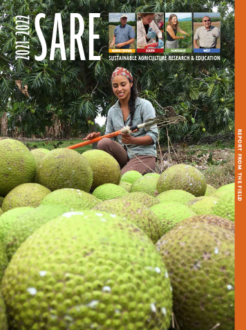The Sustainable Agriculture Research and Education (SARE) program is a producer-driven, decentralized competitive grants and education program operating in every state and island protectorate. Funded by the United States Department of Agriculture's National Institute for Food and Agriculture, the program is run by four regions (North Central, Northeast, South and West) hosted by land grant institutions. SARE Outreach provides communication and technical support at the national level.
Since 1988, SARE has funded thousands of projects to advance agricultural innovation that promotes profitability, stewardship of the land, air and water, and quality of life for farmers, ranchers and their communities. Primary grant programs include research and education grants, professional development grants and producer grants. Depending on the region, applicants also can propose projects under special grant programs for graduate students, community development practitioners and ag educators conducting on-farm research.
Vision and Mission
SARE’s vision is an enduring American agriculture of the highest quality. This agriculture is profitable, protects the nation’s land and water and is a force for a rewarding way of life for farmers and ranchers whose quality products and operations sustain their communities and society.
SARE’s mission is to advance – to the whole of American agriculture – innovations that improve profitability, stewardship and quality of life by investing in groundbreaking research and education.
